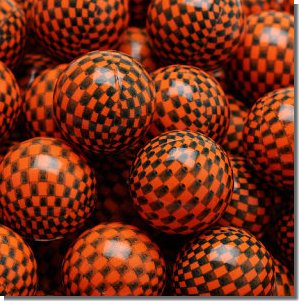The Different Types of Paintballs Available
Ultimately, everything else you buy to play the game is used to do one thing: successfully deliver a paintball onto your target. So with that in mind is one paintball any better than another?

To be brutally honest, the answer is maybe.
There are many paintball manufacturers out there. All of them make boasts and promises that might or might not be true.
Diablo, Nelson, Evil, Core... these companies will tell you that that their paintballs move faster, fly straigher, and break more often than their competitors' products do.
And so they'll create special ammunition in different colors, with different grades of thickness. They'll use special formulas when creating the gel capusle. They'll stamp stars and lines and neat little patterns on the outer shell of their paintballs, and then jack up the price per case.
This is where players will begin talking about regular paintballs versus "tournament grade" ammo, and some will swear that the right paintball makes all the difference.
And other players I've talked to? They laugh. They tell me a paintball is just a paintball, and that specialty ammo is nothing more than a gimmick used by the manufacturers to make their paintballs look a little prettier while charging tons more money for them.
Cheap Paintballs vs. Expensive Ones
In the end, it's up to you to determine whether or not the more expensive ammunition is worth it.
Companies can make whatever claims they want (and often will), but at the end of the day it's up to you to say whether a $100 case of paintballs shoots better than a $50 case.
I think it boils down to usage. If you're going out into the woods on a Saturday to shoot up your friends or coworkers, a cheaper product isn't going to kill your wallet. But if you're in the semi-finals of a speedball tournament and are looking for every edge possible? You might want to consider some of today's AAA high performance, thin-shelled, or even dimpled paintballs from companies like Diablo and Evil.
Basically, use the paintball that you need. If your gun isnt' made to handle a thin-shelled gelatin capsule, it's going to break or chop paintballs all day long. And if you're shooting low-grade paintballs with a high-end marker? You might be limiting your gun's performance a bit by holding it back.
Try some different kinds of ammo yourself, to see if you like one better than the other. Buying smaller bags of balls can help you try a wider assortment of different paint ball types. When comparing, make sure you fire it through the same gun. That way you eliminate different gun performances from the equation.
Below are some of the bigger companies that make paintball ammo today:
Final Words on Buying Paintballs
Paintballs generally come in cases, with 2000 balls to a case. Each case holds four 500 round bags, to make a case easy to split a case with your friends.
NOTE: Some paintball fields do NOT allow outside paint. These fields want you to buy your ammo from them, and they'll force you to do so by disallowing any other color paint than their own.
Referees will even check your hopper (especially if you have a transparent one) to see the color of the paintball shell you're using. If it's not the active color on the field that day, none of your shots will count.
When buying paint to be used at a paintball field, make sure it's okay to do so. Or at the very least, find out which fill color you'll be using. That way you're not shooting orange paint on a day when everyone else is turning the field pink.
Other Equipment, Gear, and Paintball Protection
When playing paintball, it's always good to be prepared. So whether you're a first-time player or a seasoned veteran, check out the list of equipment below:












